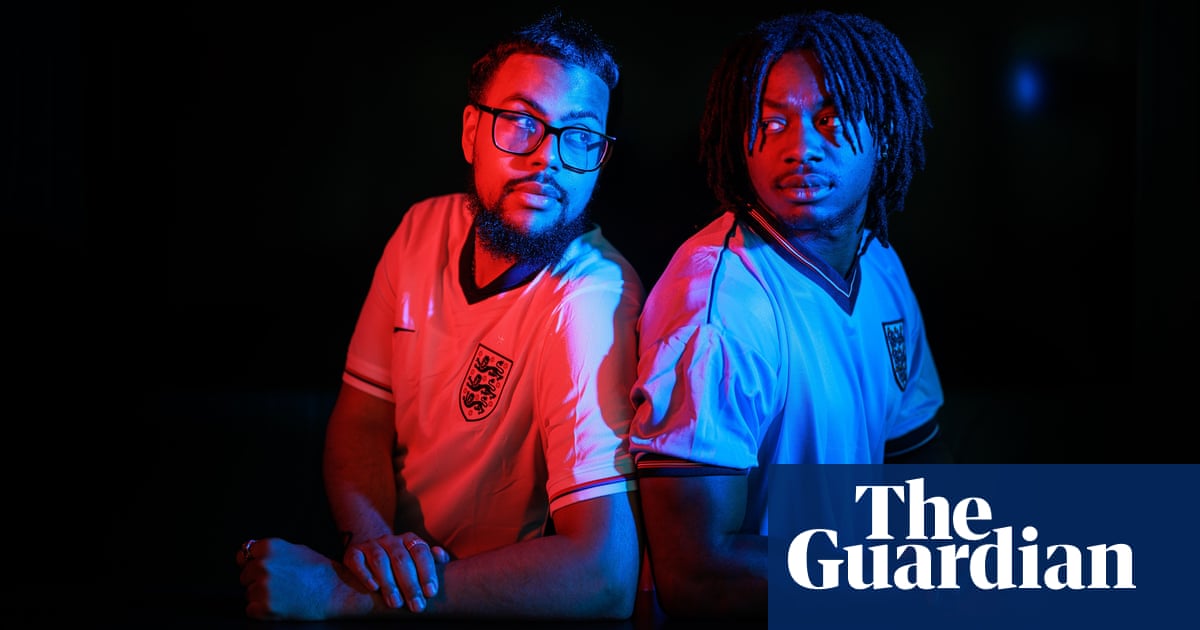“Football and music are the biggest influences in the country,” says the artist CreezeOn, also known as Cree Reid. “I think that they are vehicles of expression that have been put there for us to explore.”
The 20-year-old features on the recently released Euro 2024 anthem It’s OUR Team alongside another up-and-coming rapper, Keaton Amory (Ke4t). The song backs England while calling out racism, and has been produced by the Sheffield-based Toddla T in collaboration with the Black Footballers Partnership.
The BFP co-founder Delroy Corinaldi says it aims to “move the country forward through a united vision” to tackle discrimination in football and serve as a rallying call before England kick off in Germany against Serbia next Sunday.
Euro 2020 ended in heartbreak for England, who lost the final on home turf after a gut-wrenching penalty shootout went the way of Italy. Three black players – Jadon Sancho, Marcus Rashford and Bukayo Saka – missed and were subjected to horrifying online racist abuse.
The Birmingham-based Reid is the nephew of the former Aston Villa, Liverpool and England player Mark Walters and had been told of his uncle’s experiences with racism while playing in the 1980s. After the Euro 2020 final Reid felt unsafe. “I was feeling a little bit like: ‘I’m hearing racist remarks. Is this how people go on when we lose?’”
The melodic refrain serving as the song’s intro is Reid soulfully uttering the words: “We rise, we fall, we stand together.” It is followed by a rapid-fire roll call of England players including Jude Bellingham, Cole Palmer and Kobbie Mainoo over a garage‑inspired, bell‑and‑whistle‑laden anthemic instrumental.
Amory, 26, agreed to the collaboration because his values matched those of the BFP. The abuse of Sancho, Rashford and Saka reminded him of what happened to Emile Heskey in 2008 when the forward was racially abused by Croatia fans while playing for England. Amory had just started watching football.
“When it [racism] did happen to me in another part of the UK, I was just like: ‘Yo, if this is how I feel …’” says Amory, who is from Solihull. “Imagine having a big, big weight on your shoulder such as the Euros. Feeling like they let the country down, not congratulated for even participating in such a high level of sport and representing England.”
Heskey, who has endorsed the song, played with members of England’s so-called golden generation. The tribalism of club football defined that team, with representatives of Liverpool, Manchester United and Chelsea admitting that competing against each other in the early 2000s disrupted harmony.
Since Gareth Southgate took charge, England have achieved their best performance at a European Championship and he has been widely credited with an improved atmosphere in which players are unified by a common cause. Race has divided players in England dressing rooms of the past.
The BFP, which has more than 100 members, aims to help black footballers with their professional development, effect change in the game and guide the different communities that see the sport as central to societal change. They regard the lack of diverse representation in the sport’s governing bodies as a serious obstacle to challenging discrimination throughout the game, however it manifests itself.
Corinaldi says of It’s OUR Team: “Ours as in the whole country: black, white, brown coming together to help change the nation to be where we want it to be, which is with togetherness and equality.
“You get, unfortunately, a cabal of people who look the same, act the same, went to the same schools and have continued to benefit for themselves and people that look like them. Whereas we are about the ‘our’. A diverse game has created massive results, along with a diverse England team.”
after newsletter promotion
Reflecting on a society that remains as fractured as ever by the demonisation of minorities and with culture wars becoming a weapon of choice in politics, Corinaldi points to a bigger purpose. There are attempts in the song not only to rally this England team but to rally football and the world at large to confront existing problems.
In the later part, there is the particularly striking line: “Dear clubs, we wanna see more black managers. Black managers are 41% more likely to be fired if there ain’t a problem. How come them stats ain’t addin’ up?”
Corinaldi says: “At the moment, it’s very mono. There are no black executives at the FA, there are no black executives at the Premier League, there are no black executives in the English Football League. Therefore, even if an absence of diverse voices leads to wonderful messaging, because we can all do marketing [around anti racism], it doesn’t actually lead to the delivery of the change.”
Amory is hopeful that the catchy anthem “takes hold” of younger listeners and that social media helps it to transcend the line between popular culture and sport. The intention is not to create a viral moment but establish a consciousness among a generation of listeners who are young and energised enough to contribute to the solution.
The hope is they have a quintessential summerjam in waiting. But is it of the World in Motion/Three Lions vintage or will the annals of history condemn it to Diamond Lights by Glenn and Chris territory? Only time will tell.

